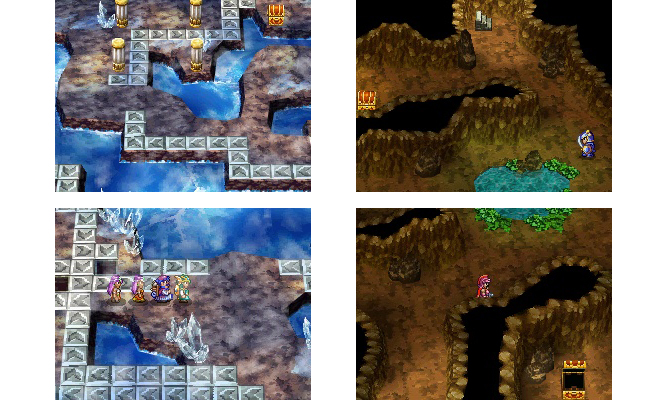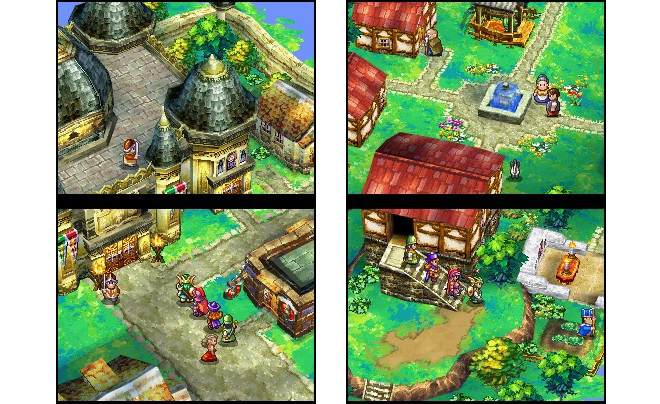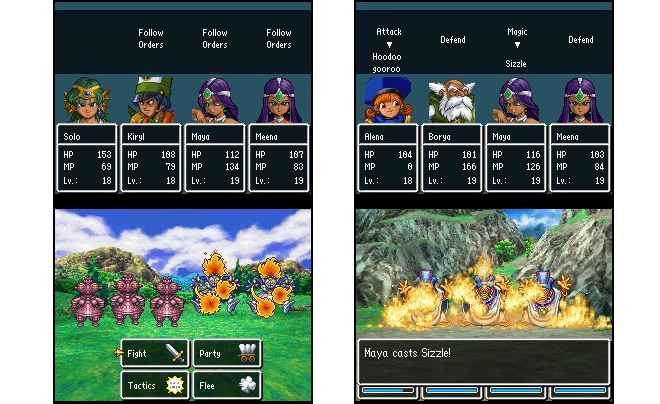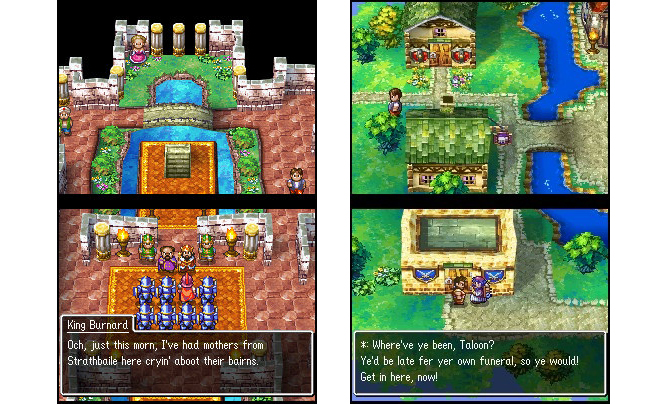Dragon Quest IV: Chapters of the Chosen — Exactly What it Says
 The overall gameplay flow of Dragon Quest IV: Chapters of the Chosen may be familiar to RPG fans who have been playing games in the genre for a while.
The overall gameplay flow of Dragon Quest IV: Chapters of the Chosen may be familiar to RPG fans who have been playing games in the genre for a while.
It introduces an excellent way to familiarize you with its characters, by playing through their specific chapters to walk you through their history and search for the chosen one (of which you’re given your choice of name and gender), hence the game’s subtitle. This is how the first four chapters are structured, before you begin the fifth, massive chapter with the chosen one. Its earlier moments consist of linear, by-the-numbers RPG structuring (especially these days), but in Chapter V the world opens for you to explore it at your own leisure. Through this structure it actually offers a wonderful sense of exploration, leaving you to uncover the secrets of the world.
You may have figured out by now that its structure is similar to Final Fantasy VI‘s. Suddenly one of your favorite games isn’t so innovative after all!
 The dungeons are empty-though-invigorating environments...
The dungeons are empty-though-invigorating environments...But that’s perfectly acceptable practice. There’s nothing inherently wrong with a game being inspired by another in terms of structure; what matters is how it uses said ideas, and whether it can use them effectively; which FFVI certainly did. And I’m not going to bother delving into the main villain’s inspiration, which will pop out as obvious to players once they run into him – even down to his motivations for his descent into malignance.
This may be a recent release, but DQIV on DS maintains a feel that adheres to its NES origins. It’s very light on story and exposition, which allows for a more personable experience with its characters. Sure, some of the exposition is gone because of Square Enix bafflingly removing the “Party Talk” feature from the international versions, but the story itself is rather sparse on detail. But that’s not to say it isn’t sophisticated; everything isn’t spelled out, leaving you, the player, to figure things out. In other words, it’s the anti-Xenogears.
This game moves at a pretty rapid pace. It’s a little slower than the original thanks to the added animations for monsters, but that’s negligible. It’s typical turn based material, and random encounters can happen often, but they’re so brisk that it’s not a problem. As the game goes on, you’ll realize that there’s an excellent balance between your party members and the enemies, which is especially evident during boss battles. Of course, you could always choose to grind and overpower your enemies, but the outcome of every battle won’t be as satisfying as merely successfully outwitting then.
 …but the towns are pretty lively.
…but the towns are pretty lively.DQIV really isn’t that different from the original, aside from the graphics and sound being given an overhaul. Its look is similar to that of Dragon Quest VII, but the result here is a smoother transition and a level of consistency between environments that make it nowhere near as hideous as that game — DQVII’s “finished” product looked a little rough, with portions of the game showing its SNES origins and had sections that were obviously built on PSX. You could say it had a very troubled development period. Not to mention that the PSX didn’t do 2D very well.
The Dragon Quest franchise has always had the same sound effects for nostalgia’s sake, and they feel right in place here. The music is always very well done, and is a testament to why people like Koichi Sugiyama’s compositions so much, despite his dubious personal opinions on a certain other matter (go down to “The Case Against Sugiyama). My cohort may not have expressed similar sentiments in his review — though he did play through the NES version — but the music is incredibly in-fitting with the game’s style, especially the character themes. It’s not without its problems, like hearing the same dungeon themes a little too often; but that issue doesn’t lie within the music itself.
 Some battles require some thought. Some don’t. RPGs.
Some battles require some thought. Some don’t. RPGs.As a remake, DQIV on DS serves as an excellent way to preserve the style of the original. This was also done for nostalgia’s sake. A pet peeve some gamers have with remakes of their favorite games is how they attained a sense of affinity for the original title, something that could be lost with a remake. The DS and PSX versions of DQIV keep that sense perfectly. Not to say there’s anything wrong with complete overhauls like Final Fantasy IV on DS, but it’s nice to see which interpretations developers like to use. Whatever form an interpretation will take depends on the audience it’s being aimed towards.
The main point of contention with DQIV for DS is the localization, which has generated mixed reactions. Dragon Quest VIII contained some beautiful voice work, complete with dialects that matched whatever region NPCs and specific characters were from. Since this game doesn’t have voice work, Square Enix, in association with Plus Alpha Translations, sought to convey this through its text. The results are pretty admirable and keep conversations with every NPC lively, but it does have the tendency to go a little overboard at times.
 The translation gives everyone a sense of character. You know, if you like that.
The translation gives everyone a sense of character. You know, if you like that.Take the speaking style used for the Kingdom of Zamoksva, where characters Tsarevna Alena, Kryll, and Borya are from. Zamoksva and its surrounding townships are definitely based on a fantastical version of Russia, so it follows that everyone from that area should have a Russian accent while speaking English. The localization team has done their best at keeping that tone, but it can be esoteric for people not accustomed to hearing that dialect used in either real life or other forms of media. Talking to NPCs in RPGs is usually a passive experience, especially if you’ve done it a lot. But the positive effect of hearing unfamiliar dialects in an RPG is that it makes talking to NPCs a joy, and the time you’ll spend making sense of everything will assist in helping you pay attention.
What makes Dragon Quest IV one of the most admired games in the franchise is its sense of subtlety in terms of establishing a plot, along with its unique approach to telling its story. It has ideas that many RPGs still haven’t explored, despite the original releasing 20 years ago. The excellent, if a tad overdone, localization only adds to the charm the game offers. If you haven’t played it yet, definitely go get it. This makes up for not receiving the PSX version.
Or perhaps you prefer the original?
